| Listing 1 - 10 of 19 | << page >> |
Sort by
|
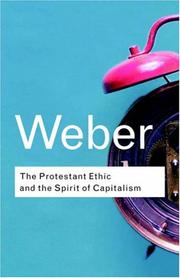
ISBN: 0415255597 041525406X Year: 2001 Publisher: London ; New York : Routledge,
Abstract | Keywords | Export | Availability | Bookmark
 Loading...
Loading...Choose an application
- Reference Manager
- EndNote
- RefWorks (Direct export to RefWorks)
Capitalism --- Protestant work ethic. --- Religious aspects --- Protestant churches. --- the protestant ethic --- the spirit of capitalism --- the social effects of capitalism
Book
ISBN: 9780521895095 052189509X 9780511488757 9780521174442 0511414838 9780511414831 9780511415517 0511415516 9780511413247 0511413246 1107187753 1281751480 9786611751487 0511488750 0511412312 0511414188 0521174449 Year: 2008 Publisher: Cambridge Cambridge University Press
Abstract | Keywords | Export | Availability | Bookmark
 Loading...
Loading...Choose an application
- Reference Manager
- EndNote
- RefWorks (Direct export to RefWorks)
Max Weber's The Protestant Ethic and the Spirit of Capitalism is one of the best-known and most enduring texts of classical sociology, continually inspirational and widely read by both scholars and students. In an insightful interpretation, Jack Barbalet discloses that Weber's work is not simply about the cultural origins of capitalism but an allegory concerning the Germany of his day. Situating The Protestant Ethic in the development of Weber's prior and subsequent writing, Barbalet traces changes in his understanding of key concepts including 'calling' and 'rationality'. In a close analysis of the ethical underpinnings of the capitalist spirit and of the institutional structure of capitalism, Barbalet identifies continuities between Weber and the eighteenth-century founder of economic science, Adam Smith, as well as Weber's contemporary, the American firebrand Thorstein Veblen. Finally, by considering Weber's investigation of Judaism and capitalism, important aspects of his account of Protestantism and capitalism are revealed.
Weber, Max --- Capitalism --- Protestant work ethic --- Religious aspects --- Protestant churches --- Protestant work ethic. --- Protestant churches. --- Weber, Max, --- History and criticism. --- Protestant ethic --- Work ethic --- Protestantism and capitalism --- Social Sciences --- Sociology --- Capitalism - Religious aspects - Protestant churches
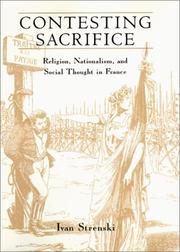
ISBN: 0226777367 Year: 2002 Publisher: Chicago : University of Chicago Press,
Abstract | Keywords | Export | Availability | Bookmark
 Loading...
Loading...Choose an application
- Reference Manager
- EndNote
- RefWorks (Direct export to RefWorks)
Christianity and politics --- Sacrifice --- History. --- Catholic Church --- Christianity --- History of doctrines. --- French culture --- France --- the idea of sacrifice --- French history --- social theories --- Durkheim --- Hubert --- Mauss --- the protestant ethic --- capitalism --- catholicism --- religion --- religion and politics
Book
ISBN: 9155430341 Year: 1993 Publisher: Uppsala : Almqvist & Wiksell : Acta universitatis upsaliensis,
Abstract | Keywords | Export | Availability | Bookmark
 Loading...
Loading...Choose an application
- Reference Manager
- EndNote
- RefWorks (Direct export to RefWorks)
241.63*9 --- Christian ethics --- Protestant work ethic --- Work --- -Industry (Psychology) --- Method of work --- Work, Method of --- Human behavior --- Labor --- Occupations --- Work-life balance --- Protestant ethic --- Work ethic --- Ethical theology --- Moral theology --- Theology, Ethical --- Theology, Moral --- Christian life --- Christian philosophy --- Religious ethics --- theologische ethiek: arbeid; technologie; techniek; wetenschap --- Religious aspects --- -Protestant churches --- Christian ethics. --- Protestant work ethic. --- Protestant churches. --- -theologische ethiek: arbeid; technologie; techniek; wetenschap --- 241.63*9 theologische ethiek: arbeid; technologie; techniek; wetenschap --- -Protestant ethic --- Industry (Psychology) --- Religious aspects&delete& --- Protestant churches --- Theologie protestante
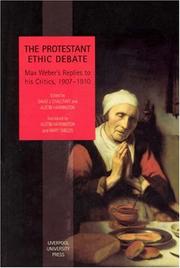
ISBN: 1781388156 1846313864 9781846313868 9781781388150 0853239762 9780853239765 085323986X 9780853239864 Year: 2001 Publisher: Liverpool : Liverpool University Press,
Abstract | Keywords | Export | Availability | Bookmark
 Loading...
Loading...Choose an application
- Reference Manager
- EndNote
- RefWorks (Direct export to RefWorks)
Max Weber's The Protestant Ethic and the Spirit of Capitalism continues to be one of the most influential texts in the sociology of modern Western societies. Although Weber never produced the further essays with which he intended to extend the study, he did complete four lengthy Replies to reviews of the text by two German historians. Written between 1907 and 1910, the Replies offer a fascinating insight into Weber's intentions in the original study, and the present volume is the first complete translation of all four Replies in English.
Protestant work ethic. --- Capitalism --- Religion and sociology. --- Religion and society --- Religious sociology --- Society and religion --- Sociology, Religious --- Sociology and religion --- Sociology of religion --- Sociology --- Protestant ethic --- Work ethic --- Protestantism and capitalism --- Religious aspects --- Protestant churches. --- Weber, Max, --- ウェーバー, マックス --- Criticism and interpretation. --- Sociology. --- Capitalism. --- Market economy --- Economics --- Profit --- Capital --- Social theory --- Social sciences
Book
ISBN: 0252038835 0252096797 9780252096792 9780252038839 Year: 2015 Publisher: Urbana, Illinois : University of Illinois Press,
Abstract | Keywords | Export | Availability | Bookmark
 Loading...
Loading...Choose an application
- Reference Manager
- EndNote
- RefWorks (Direct export to RefWorks)
"Exploring the intersection between Chicago's eight-hour movement and Protestant religious culture over a fifty-year span, this project considers how workers and clergy contested the religious meaning of the eight-hour system and the legitimacy of legislating limitations on overwork. Showing that behind every religious appeal was a contest over whose religious meanings would define industrial conditions and conflicts in Chicago, William Mirola examines how both workers and Protestant clergy wove and rewove working-class religious cultures and ideologies into strategic and rhetorical frames around the issue of an eight-hour workday. Mirola traces the successive framing of eight-hour reform from pre-1880's, when most Protestant clergy supported long hours to keep workers from idleness, intemperance, and secular leisure activities, through the 1890's, when eight-hour support among Protestant clergy gained ground as the result of a new social consciousness spurred by intensified worker protest and ongoing employer resistance to limiting working hours, into the early decades of the twentieth century, as religious framing of the eight-hour movement declined in favor of political and economic arguments. Mirola argues that the ongoing conflicts between Chicago workers and employers transformed both how clergy spoke about the eight-hour movement and what they were willing to do, through alliances with the labor movement, to see the eight-hour day enacted as industrial policy. By examining religious framing within the eight-hour movement, the author illustrates the potential and the limitations of religious culture and religious leaders as forces in industrial reform"-- "During the struggle for the eight-hour workday and a shorter workweek, Chicago emerged as an important battleground for workers in "the entire civilized world" to redeem time from the workplace in order to devote it to education, civic duty, health, family, and leisure. William A. Mirola explores how the city's eight-hour movement intersected with a Protestant religious culture that supported long hours to keep workers from idleness, intemperance, and secular leisure activities. Analyzing how both workers and clergy rewove working-class religious cultures and ideologies into strategic and rhetorical frames, Mirola shows how every faith-based appeal contested whose religious meanings would define labor conditions and conflicts. As he notes, the ongoing worker-employer tension transformed both how clergy spoke about the eight-hour movement and what they were willing to do, until intensified worker protest and employer intransigence spurred Protestant clergy to support the eight-hour movement even as political and economic arguments eclipsed religious framing. A revealing study of an era and a movement, Redeeming Time illustrates the potential--and the limitations--of religious culture and religious leaders as forces in industrial reform"--
Eight-hour movement --- Hours of labor --- Labor movement --- Protestant work ethic --- Protestantism --- History. --- Religious aspects --- Christianity. --- History --- Religious aspects&delete& --- Christianity --- E-books --- Church history --- Protestant churches --- Reformation --- Protestant ethic --- Work ethic --- Labor and laboring classes --- Social movements --- Alternative work schedules --- Children --- Labor, Hours of --- Work hours --- Work schedules --- Working-day --- Working hours --- Work --- Labor productivity --- Labor time --- Timekeeping --- Weekly rest-day --- RELIGION / Religion, Politics & State. --- SOCIAL SCIENCE / Sociology of Religion. --- POLITICAL SCIENCE / Labor & Industrial Relations.
Book
ISBN: 128077276X 9786613683533 9004229957 9789004229952 9789004216761 9004216766 6613683531 Year: 2012 Publisher: Leiden ; Boston : Brill,
Abstract | Keywords | Export | Availability | Bookmark
 Loading...
Loading...Choose an application
- Reference Manager
- EndNote
- RefWorks (Direct export to RefWorks)
Sociological theory regarding the contemporary (1970's to the present) phenomenon of globalization focuses either on convergence or hybridization. The former, convergence, highlights the ever-increasing homogenization of cultures and societies around the globe via socioeconomic rational forces. From this perspective globalization is tantamount to Westernization or Americanization of other cultures and societies via neoliberal economic, market, subjugation. The latter, hybridization, emphasizes heterogeneity, the mixture of cultural forms out of the integration of society via globalizing processes stemming from improvements in information technology, communications, mass media, et cetera In this latter form, cultures and societies are not homogenized, but are cultural forms that are syncretized with liberal democratic Western capitalist rational organization. In this work, Mocombe synthesizes the two positions by suggesting that globalization under American hegemony are the same process, convergence, and that the only alternative to this thesis of convergence is Samuel P. Huntington’s (1996) differential hypothesis in which a clash of civilization are the result of eight intransigent cultural frameworks—Sinic, Japan, Hindu, Islamic, Orthodox, Western Europe, North America, and Africa—that dominate the globe. Refutating Huntington’s thesis, Mocombe suggests there are really only two opposing counter-hegemonic forces to the convergence towards Westernization or Americanization: the earth itself and Islamic Fundamentalist movements.
Globalization --- Cultural fusion --- Capitalism --- Americanization. --- African Americans --- Protestant work ethic --- Hegemony --- Hegemonism --- Political science --- Sociology --- Unipolarity (International relations) --- Protestant ethic --- Work ethic --- Afro-Americans --- Black Americans --- Colored people (United States) --- Negroes --- Africans --- Ethnology --- Blacks --- Immigrants --- Assimilation (Sociology) --- Civics --- Culture fusion --- Fusion, Cultural --- Hybridism (Social sciences) --- Hybridity (Social sciences) --- Cultural relations --- Acculturation --- Ethnicity --- Multiculturalism --- Cultural pluralism --- Global cities --- Globalisation --- Internationalization --- International relations --- Anti-globalization movement --- Social aspects --- Philosophy. --- Social aspects. --- Cultural assimilation. --- Cultural assimilation --- Black people --- Cultural hybridity --- Transculturalism --- Transculturation
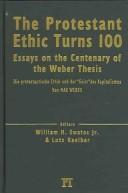
ISBN: 1315632543 1317253353 1317253345 9781317253341 9781317253358 9781594510984 9781594510991 9781315632544 9781317253334 Year: 2016 Publisher: London ; New York : Routledge,
Abstract | Keywords | Export | Availability | Bookmark
 Loading...
Loading...Choose an application
- Reference Manager
- EndNote
- RefWorks (Direct export to RefWorks)
Capitalism --- Religion and sociology. --- Christian ethics. --- Calvinism. --- Protestant work ethic. --- Protestant ethic --- Work ethic --- Reformed Protestantism --- Congregationalism --- Reformation --- Reformed Church --- Theology, Doctrinal --- Arminianism --- Puritans --- Zwinglianism --- Ethical theology --- Moral theology --- Theology, Ethical --- Theology, Moral --- Christian life --- Christian philosophy --- Religious ethics --- Religion and society --- Religious sociology --- Society and religion --- Sociology, Religious --- Sociology and religion --- Sociology of religion --- Sociology --- Protestantism and capitalism --- Religious aspects --- Protestant churches. --- Doctrines --- Weber, Max,
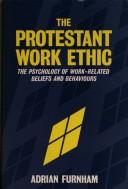
ISBN: 0415017041 041501705X Year: 1990 Publisher: London New York Routledge
Abstract | Keywords | Export | Availability | Bookmark
 Loading...
Loading...Choose an application
- Reference Manager
- EndNote
- RefWorks (Direct export to RefWorks)
Protestant work ethic --- Ethique du travail protestante --- Psychological aspects --- Aspect psychologique --- -#SBIB:316.334.2A10 --- 316.6 --- #SBIB:321H440 --- Protestant ethic --- Work ethic --- Arbeids-, bedrijfs- en economische sociologie: algemeen --- Gedragstheorie. Sociaal gedrag. Sociale psychologie --(gedrag en zelfconcept van het individu in de groep z.o. {159.923.33}) --- Westerse politieke en sociale theorieën vanaf de 19e eeuw: christelijke gedachte: opvattingen over economie en arbeid --- Arbeids- en organisatiepsychologie --- Psychological aspects. --- sociopsychologie van het bedrijfsleven --- sociopsychologie van het bedrijfsleven. --- 316.6 Gedragstheorie. Sociaal gedrag. Sociale psychologie --(gedrag en zelfconcept van het individu in de groep z.o. {159.923.33}) --- Sociopsychologie van het bedrijfsleven. --- #SBIB:316.334.2A10
Book
ISBN: 1852788755 Year: 1994 Publisher: Aldershot : E. Elgar,
Abstract | Keywords | Export | Availability | Bookmark
 Loading...
Loading...Choose an application
- Reference Manager
- EndNote
- RefWorks (Direct export to RefWorks)
Calvinism --- Capitalism --- Christian ethics --- Protestant work ethic --- Christian sociology --- Calvinisme --- Capitalisme --- Morale chrétienne --- Ethique du travail protestante --- Sociologie religieuse --- Religious aspects --- Protestant churches --- Aspect religieux --- Eglises protestantes --- Christianisme --- Weber, Max, --- -Christian ethics --- Sociology, Christian --- #GROL:SEMI-33:17 --- Christian social theory --- Social theory, Christian --- Sociology --- Protestant ethic --- Work ethic --- Ethical theology --- Moral theology --- Theology, Ethical --- Theology, Moral --- Christian life --- Christian philosophy --- Religious ethics --- Market economy --- Economics --- Profit --- Capital --- Reformed Protestantism --- Congregationalism --- Reformation --- Reformed Church --- Theology, Doctrinal --- Arminianism --- Puritans --- Zwinglianism --- -Protestant churches --- Doctrines --- Weber, Max --- ウェーバー --- Calvinism. --- Christian ethics. --- Protestant work ethic. --- Protestant churches. --- Morale chrétienne --- Religious aspects&delete& --- Protestantism and capitalism
| Listing 1 - 10 of 19 | << page >> |
Sort by
|

 Search
Search Feedback
Feedback About UniCat
About UniCat  Help
Help News
News